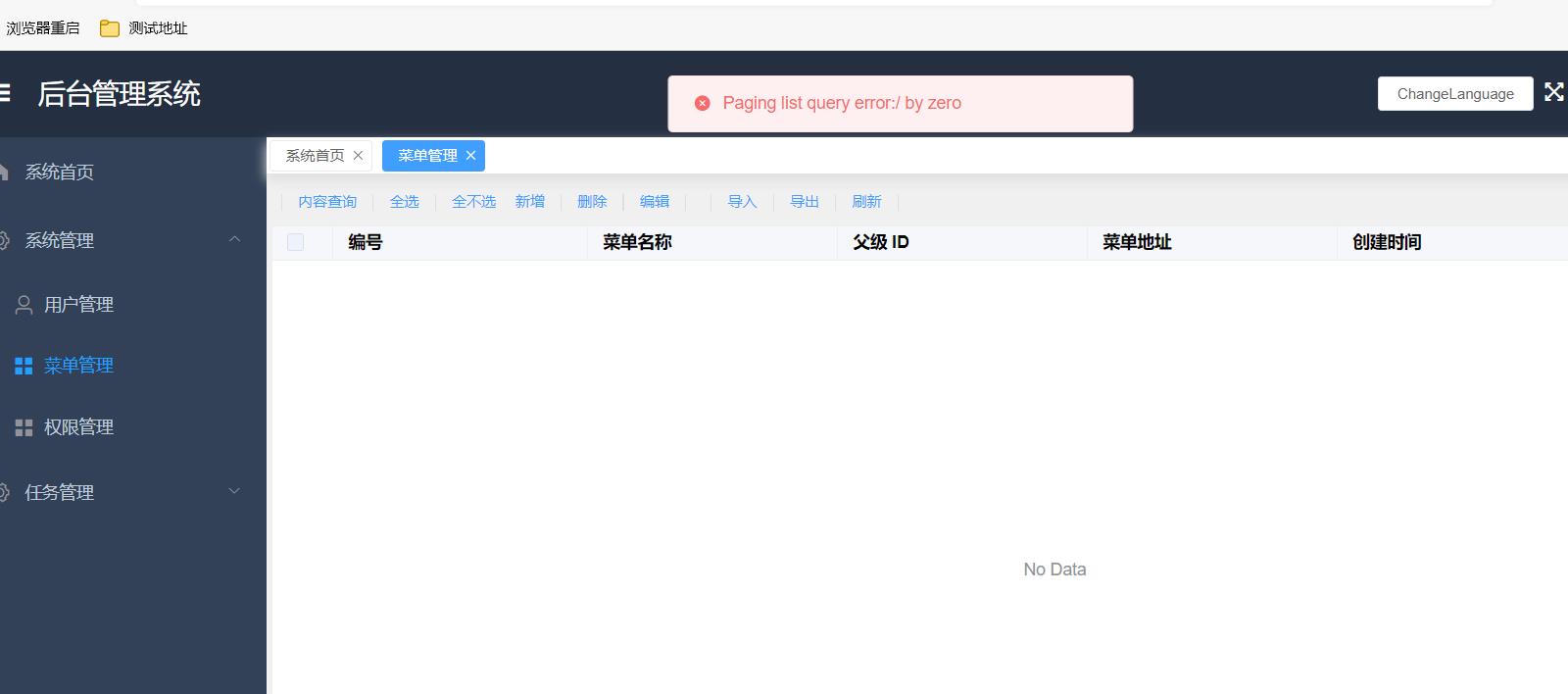# 前后端国际化多语言配置
Posted MarlonBrando1998
tags:
篇首语:本文由小常识网(cha138.com)小编为大家整理,主要介绍了# 前后端国际化多语言配置相关的知识,希望对你有一定的参考价值。
前后端国际化多语言配置
前端(Vue ElementUI)
- 项目前端使用
Vue+Elementui
编写 i18n.js
- 在这个
js中引入ElementUI的多语言资源,引入本地的多语言资源
// I18n
import VueI18n from 'vue-i18n'
import Vue from 'vue'
import locale from 'element-ui/lib/locale'
// 引入 elementui 的多语言
import enLocale from 'element-ui/lib/locale/lang/en'
import zhLocale from 'element-ui/lib/locale/lang/zh-CN'
// 引入自己定义的 I18n 文件
import myI18nEn from './i18n-en-US.json'
import myI18nZh from './i18n-zh-CN.json'
// 注册 vue-i18n
Vue.use(VueI18n)
// 默认中文
const lang = 'zh'
const i18n = new VueI18n(
locale: lang,
messages:
zh: Object.assign(zhLocale, myI18nZh),
en: Object.assign(enLocale, myI18nEn)
)
locale.i18n((key, value) => i18n.t(key, value))
export default i18n
- 新建
i18n-en-US.jsoni18n-zh-CN.json文件,就是两个JSON文件 i18n-en-US.json
"test": "切换语言"
i18n-zh-CN.json
"test": "ChangeLanguage"
在main.js 中挂载 i18n
main.js
// 引入 Vue
import Vue from 'vue'
// I18n js
import i18n from './utils/i18n/I18n.js'
// 挂载 vue
new Vue(
router,
i18n,
render: h => h(App)
).$mount('#app')
使用方式
<el-button size="mini" @click="changeLanguage">$t("test")</el-button>
<el-input :placeholder="$t('test')"></el-input>
切换全局的 i18n 语言
<el-button size="mini" @click="changeLanguage">$t("test")</el-button>
// 切换语言
changeLanguage ()
// 直接使用这个方法就可以切换
this.$i18n.locale = this.$i18n.locale === 'en' ? 'zh' : 'en'
// 保存到 Cookies 中方便后面发请求的时候拿到拼接到请求头中
Cookies.set('language', this.$i18n.locale)
往后端的请求头中增加 language 参数
- 如下封装的发送请求的
js,从Cookie中拿到上面放进去的参数,当向后端请求的时候请求头部带上languange参数
// 1->common.js中引入axios
import axios from 'axios'
import QS from 'qs'
// 引入Cookie
import Cookies from 'js-cookie'
axios.defaults.timeout = 180000 // 超时时间
// 表单提交方式还是 JSON格式提交
var flag = true
// http request 拦截器
axios.interceptors.request.use(
config =>
// 注意使用的时候需要引入cookie方法,推荐js-cookie
let token = Cookies.get('token')
let language = Cookies.get('language') === undefined ? 'zh' : Cookies.get('language')
// 登录接口不需要Token
if (config.url.indexOf('/system/login') > 0 && config.url.indexOf('/system/loginlog') < 0)
return config
// 如果是post请求 请求体自动加上token
if (config.method === 'post')
if (token)
console.log(config.headers)
config.headers =
'Content-Type': flag ? 'application/json' : 'application/x-www-form-urlencoded',
// 后端生成的Token,携带Token后请求变成非简单请求
Authorization: token,
'language': language
else if (config.method === 'get')
config.headers =
if (token)
config.headers =
'Content-Type': flag ? 'application/json' : 'application/x-www-form-urlencoded',
Authorization: token,
'language': language
return config
,
error =>
// return Promise.reject(err)
console.log(error)
)
// 2->对get请求传递过来的参数处理
function paramsToUrl (url, params)
if (!params) return url
for (var key in params)
if (params[key] && params[key] !== 'undefined')
if (url.indexOf('?') !== -1)
url += '&' + '' + key + '=' + params[key] || '' + ''
else
url += '?' + '' + key + '=' + params[key] || '' + ''
return url
// 3->在common.js中封装公用方法-----封装请求的方法
export function requireData (url, params, type, item, paramsType)
// 请求参数是表单还是 json 格式
flag = true
if (paramsType)
flag = paramsType
if (!url) return false
switch (item)
case 'back':
url = axios.defaults.baseM1URL + url
break
case 'before':
url = axios.defaults.baseM2URL + url
break
case 'taskcenter':
url = axios.defaults.baseM3URL + url
break
case 'core':
url = axios.defaults.baseM4URL + url
break
if (type === 'get')
url = paramsToUrl(url, params)
return new Promise((resolve, reject) =>
axios
.get(url, params)
.then(res =>
resolve(res.data)
)
.catch(err =>
reject(err)
)
)
else if (type === 'post')
// json格式请求头
const headerJSON =
'Content-Type': 'application/json'
// FormData格式请求头
const headerFormData =
'Content-Type': 'application/x-www-form-urlencoded;charset=UTF-8'
return new Promise((resolve, reject) =>
axios.post(url, flag ? JSON.stringify(params) : QS.stringify(params),
headers: flag ? headerJSON : headerFormData
).then(res =>
resolve(res.data)
).catch(err =>
reject(err.data)
)
)
发送请求查看头部已经有 language 的参数

查看 Elementui 原生的多语言也生效了

- 前端完整代码见:https://gitee.com/Marlon_Brando/onlineshop_before/commit/2476b93e0cf982846293bcd8d6688da9d4661cbb
后端(SpringBoot MessageSource)
使用 Spring 国际化 MessageSource
Spring默认集成了多语言直接使用就行了,注意配置文件要放在resource下面不然需要配置
配置 MessageSource 可以不用配置 当多语言文件名称不是 messages开头时候必须配置
/**
* 配置 MessageSource 其实这个可以不配置如果不配置请注意 message 多语言文件的位置
*
* @return
*/
@Bean
public ResourceBundleMessageSource messageSource()
Locale.setDefault(Locale.CHINESE);
ResourceBundleMessageSource source = new ResourceBundleMessageSource();
source.setBasenames("messages");
source.setUseCodeAsDefaultMessage(true);
source.setDefaultEncoding("UTF-8");
logger.info(LogConstant.LOG_SUCCESS_PREFIX + "I18n配置完成");
return source;
自定义 LocaleResolver 从请求头中获取多语言参数配置到当前域中
@Configuration
public class I18nConfig implements WebMvcConfigurer
private static final Logger logger = LoggerFactory.getLogger(I18nConfig.class);
/**
* 配置 MessageSource 其实这个可以不配置如果不配置请注意 message 多语言文件的位置
*
* @return
*/
@Bean
public ResourceBundleMessageSource messageSource()
Locale.setDefault(Locale.CHINESE);
ResourceBundleMessageSource source = new ResourceBundleMessageSource();
source.setBasenames("messages");
source.setUseCodeAsDefaultMessage(true);
source.setDefaultEncoding("UTF-8");
logger.info(LogConstant.LOG_SUCCESS_PREFIX + "I18n配置完成");
return source;
/**
* 自定义国际化组件生效注册 LocaleResolver Bean
*
* @return
*/
@Bean
public LocaleResolver localeResolver()
return new MyLocalResolver();
class MyLocalResolver implements LocaleResolver
/**
* 从请求中获取多语言参数,对当前域设置多语言环境
*
* @param request
* @return
*/
@Override
public Locale resolveLocale(HttpServletRequest request)
final String key = "language";
String language = request.getHeader(key);
Map<String, String> map = new HashMap<>(16);
map.put("en", Locale.ENGLISH.getLanguage());
map.put("zh", Locale.CHINESE.getLanguage());
return new Locale(map.getOrDefault(language, "en"));
@Override
public void setLocale(HttpServletRequest request, HttpServletResponse httpServletResponse, Locale locale)
注意点
// Bean 的注册 localeResolver方法名必须是这个不然注册不上
@Bean
public LocaleResolver localeResolver()
使用
@Autowired
private MessageSource messageSource;
messageSource.getMessage("core.pageListError", null, LocaleContextHolder.getLocale()
完美完成

以上是关于# 前后端国际化多语言配置的主要内容,如果未能解决你的问题,请参考以下文章